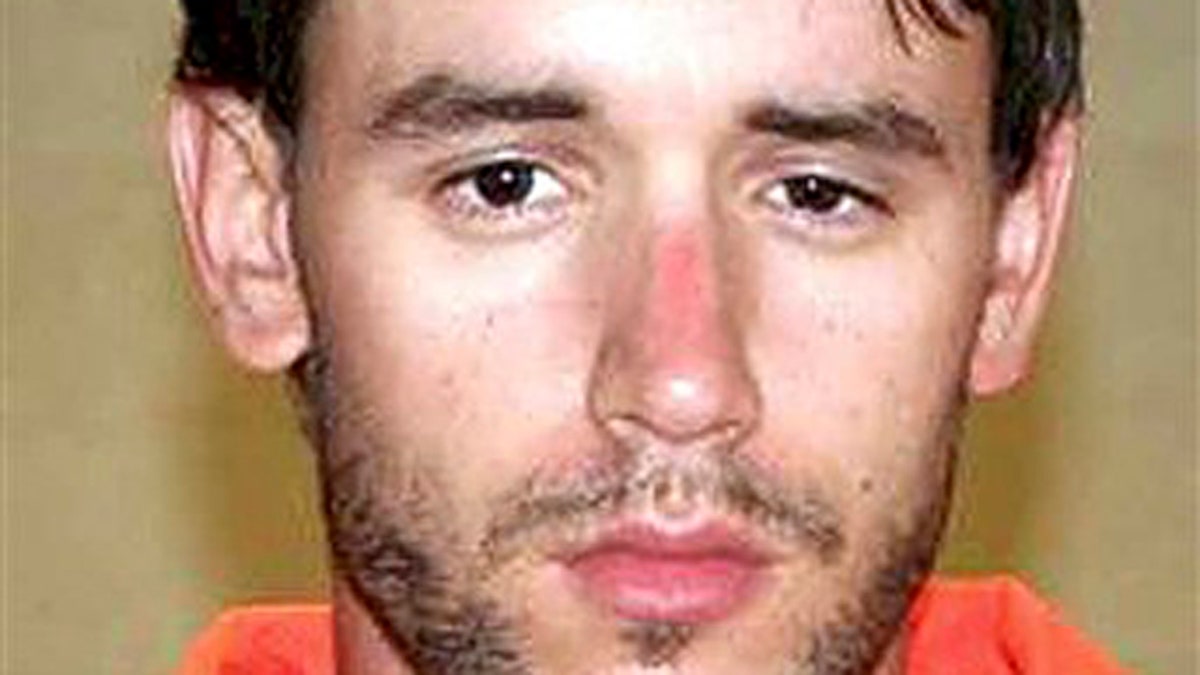
This July 23, 2007 file photo, provided by the Connecticut State Police, shows Joshua Komisarjevsky, charged in a deadly 2007 home invasion in Cheshire, Conn. (AP/Connecticut State Police)
NEW HAVEN, Conn. – The trial of a Connecticut man charged with killing a woman and her two daughters during a gruesome home invasion headed to jury deliberations after his attorneys on Tuesday blamed a co-defendant and prosecutors argued it took two men to commit the crime and that he was the leader whose motive was an 11-year-old girl he molested.
Jurors were expected to begin deliberations Wednesday in the trial of Joshua Komisarjevsky, who faces a possible death sentence if convicted of the attack in Cheshire in 2007.
Authorities say Komisarjevsky and Steven Hayes broke into the Cheshire home, beat Dr. William Petit with a bat, tied him and his family up and forced his wife to withdraw money from a bank. The house was doused in gas and set on fire, leading to the girls' deaths from smoke inhalation.
Hayes was convicted last year of raping and strangling Jennifer Hawke-Petit and killing her daughters. He is on death row.
Prosecutor Gary Nicholson said in his closing argument Tuesday that Komisarjevsky was motivated not just by money but by his interest in 11-year-old Michaela Petit, whom he spotted with her mother earlier at a supermarket. He's charged with sexually assaulting her.
"Michaela Petit, he was interested in her from the moment he saw her," Nicholson said.
Komisarjevsky's attorneys tried to delay closing arguments earlier in the day, saying Hayes wrote letters claiming he committed numerous other murders and rapes.
Komisarjevsky has insisted Hayes wanted to kill the family and he blamed Hayes for pouring the gas and lighting the house on fire. Komisarjevsky said he did not intend for anyone to die.
Prosecutors reminded the jury that the sole survivor testified there was one voice doing the talking during the crime. They cited examples in Komisarjevsky's confession in which he says he was the one talking to William Petit.
"He's the one who's controlling the situation," said State's Attorney Michael Dearington. "He's calling the shots."
Nicholson said Hayes got lost when he went out to get the gas and Komisarjevsky gave him directions back to the house when he knew the plan was to set the house on fire. If he had not directed Hayes back to the house, the family could have survived, he said.
"The defendant has been playing the blame game," Nicholson said. "Make no mistake ladies and gentlemen, this is simply damage control on his part."
The break-in was planned by Komisarjevsky, who escalated the violence by attacking William Petit with a bat, Nicholson said.
The gas was poured in a way to ensure the girls were killed, Nicholson said, noting it was on the stairs that were the girls' only escape route.
The girls suffered painful deaths and likely were screaming, knowing the end was near, he said.
Nicholson says both men had a motive to kill the family because each had committed a sexual assault and were worried about their DNA.
Jeremiah Donovan, Komisarjevsky's attorney, said Komisarjevsky admitted to molesting Michaela and assaulting her father, but he never intended to kill anyone. He played a part of Komisarjevsky's confession in which he claims he told Hayes, "No one is dying by my hand today."
Donovan, who had Komisarjevsky stand and look at the jurors for the end of his argument, also said the jury should not be swayed by what Petit's family wants. He noted that William Petit and his relatives sit a few feet away from jurors.
"They stare at you. You know what they want," Donovan said. "Put them out of your mind."
Donovan said Komisarjevsky should get a life sentence.
Komisarjevsky was sexually abused as a child and suffered multiple concussions and later turned to drugs, Donovan said. A psychologist hired by the defense said that history increased his likelihood of criminal activity.
Donovan also criticized the police response, saying officers could have stopped Hayes on his way back from the bank or by taking other actions when they arrived at the house.
"Had they acted differently, this terrible tragedy might not have occurred," Donovan said, while adding it was not a defense.
Donovan also said Komisarjevsky closed the girls' bedroom doors to give them more time to be rescued and suggested Hayley might have lived if she climbed out a window. Hayley managed to untie herself but was found at the top of the staircase.
Petit said outside of court that defense arguments like that "were a little nauseating to listen to."
Before closing arguments, the attorneys cited letters from Hayes claiming he killed 17 people in the Northeast and committed dozens of drugged date rapes. Letters to a woman in North Carolina were intercepted.
Hayes also says he would have killed Komisarjevsky if they got away with the Connecticut crime, according to the defense motion.
Judge Jon Blue denied a request to delay closing arguments, saying the letters didn't help Komisarjevsky's case.
Hayes' attorney, public defender Thomas Ullmann, said Tuesday that he hadn't seen the letters and hadn't previously heard of any claims of other killings and rapes by Hayes. Ullmann declined to comment further. Prosecutors also declined to comment.
The three handwritten letters were written in August or September and detail how he raped and strangled women, according to a defense motion that calls the description "eerily similar" to what Hayes did to Hawke-Petit.
Defense attorneys say Hayes took the women's sneakers to fulfill a sexual fantasy. Hayes' sneaker fetish came out during his trial, and Komisarjevsky's attorneys say women's sneakers were seized from his house.





















